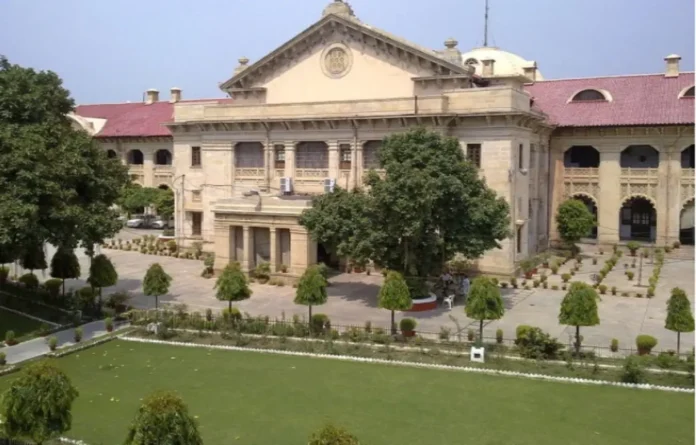The Allahabad High Court while dismissing an application said the fact that the victim woman and the accused husband were residing as husband and wife at the relevant time is sufficient to prosecute the case of dowry death.
A single-judge bench of Justice Raj Beer Singh passed this order while hearing an application under section 482 filed by Adarsh Yadav.
The application under Section 482 Cr.P.C has been preferred against the order dated 30.04.2024, passed by the Additional District and Sessions Judge, Prayagraj, in Sessions Trial under Sections 498-A, 304-B I.P.C and Section 3/4 Dowry Prohibition Act, 1961, Police Station – Kotwali, District – Prayagraj, whereby the application filed by applicant under Section 227 Cr.P.C for discharge has been rejected.
It is submitted by counsel for the applicant that impugned order is against facts and law and thus, liable to be set aside.
As per prosecution version, the marriage of the deceased has taken place with one Rohit Yadav and that there is no credible evidence that she has obtained divorce from said Rohit Yadav.
In fact the deceased has started living with the applicant in a live-in relationship and no marriage has taken place between the deceased and applicant. It was also pointed out that even a period of one year has not been passed since the marriage of the deceased with Rohit Yadav.
In view of these facts, it cannot be said that the deceased was the legally wedded wife of the applicant and thus, no prima facie case under Section – 304-B I.P.C is made out. It was stated that the trial court had not considered the facts in the correct perspective and committed error by rejecting the application of the applicant.
A.G.A has opposed the application and submitted that in the first information report, it has been clearly mentioned that after marriage of deceased with said Rohit Yadav, she was divorced by him and thereafter marriage of deceased with applicant has taken place through court and there are allegations that deceased was harassed by the applicant on account of dowry. Deceased has committed suicide at the premises of applicant.
It was submitted that whether the marriage between deceased and applicant was lawful or not, is a question of fact and that can only be examined during trial.
The Court observed,
It is well settled that while considering discharge application, the Court is to exercise its judicial mind to determine whether a case for trial has been made out or not. At this stage, a mini trial cannot be held and the Court can shift and weigh the evidence for the limited purpose of finding out whether or not a prima facie case against the accused is made out or not. Where material placed on record discloses grave suspicion against the accused, which has not been properly explained, the Court will be fully justified in rejecting application for discharge. The Court is not to hold a mini trial by marshalling the evidence.
In the case, the main contention of the counsel for applicant is that earlier the deceased was married with one Rohit Yadav and later on she has started living with applicant in live-in relationship without obtaining divorce from said Rohit Yadav and thus, the deceased is not legally wedded wife of applicant and therefore the provisions of Section – 304-B I.P.C are not attracted against applicant.
Perusal of record shows that in the first information report, it was alleged that after sometime of marriage of deceased with Rohit Yadav, applicant has molested her and the deceased was divorced by her husband Rohit Yadav and after that the parents of applicant have told that they would accept her as wife of applicant and marriage of deceased with applicant has taken place through court but later on she was harassed by the applicant and he demanded money from her and caused her death.
Thus, there is clear averment in the first information report that marriage has taken place between deceased and applicant. It is not disputed that at the time of incident, she was residing with the applicant. Even otherwise, the question whether the deceased was the legally wedded wife of the applicant or not cannot be decided in these proceedings under Section – 482 Cr.P.C.
The Court further observed that,
Following the aforesaid judgment, the Chhattisgarh High Court in case of Mohitram vs State of Chhattisgarh 2004 (3) MPHT22 (CG) has held that the intention of legislature behind inserting the provisions of Section 304-B I.P.C was that husband and his relatives, who are responsible for the dowry death of a woman should be brought into mischief of dowry death whether the marriage in question was valid or not.
It was observed that in order to attract provisions of Sections 304-B and 498-A of I.P.C, it is sufficient to show that the victim woman and accused husband were residing as husband and wife at the relevant point of time.
In this case, for the sake of arguments even if it is assumed that the deceased does not fall within the ambit of legally wedded wife, there is ample evidence on record that applicant and deceased were residing together as husband and wife at the relevant point of time.
“In view of aforesaid facts, the contention raised on behalf of applicant that provisions of Section 304-B I.P.C is not attracted has no force. The perusal of the impugned order shows that the trial court has considered all relevant facts of the matter and the application filed by applicant for discharge was rejected by a reasoned order. No such material illegality or perversity could be shown in the impugned order, so as to require any interference by the Court by invoking extraordinary jurisdiction under Section 482 Cr.P.C. The application under Section 482 Cr.P.C lacks merit and thus liable to be dismissed,” the Court also observed while dismissing the application.


